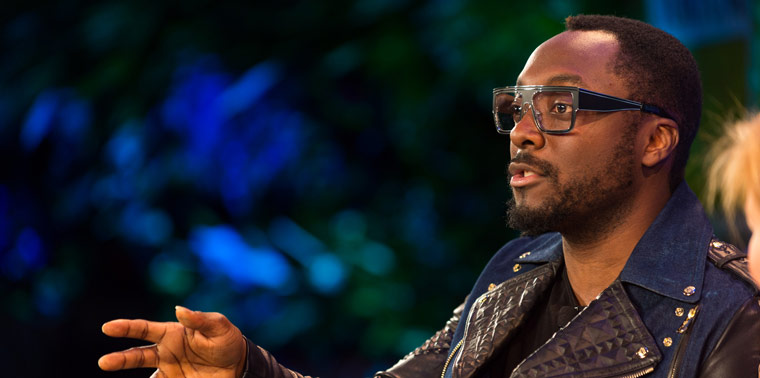May 10, 2013 — Will.i.am was sweating. You couldn’t see it. But he was sweating on the inside.
“It’s intimidating, you know, to be in front of like all the top Coke execs,” the founder of the hip-hop group Black Eyed Peas said recently at Fortune’s Brainstorm GREEN in Laguna Niguel, Calif.
Will.i.am was describing the presentation he gave to the Coca-Cola Company that challenged the company and its executives to better convey sustainability. He had been searching for a way to turn the word “Coke” into a verb to create an initiative toward that end. (“And if you don’t believe that verbs are important for companies to become, you should Google it,” the rapper said.) He eventually found the solution by reworking the letters to form “Ekoc,” then adding sustainability concepts to the new word. So: Eko-cycle, Eko-consumption, Eko-credibility, Eko-consciousness.
The concept stuck.
In July 2011, Coca-Cola and will.i.am launched the brand initiative called EKOCYCLE, which inspires existing brands to create products made from recycled materials.
A combination of events led will.i.am to the EKOCYCLE idea. First, the artist says, he became weary of being approached for campaigns and endorsements that didn’t resonate. “You have a hot song on, you’re traveling, and, ‘Yo, we want you to do this one campaign for us. We’re going to give you a certain amount of money to endorse our thing, hold our product like this,’ and I just got tired of that,” he said in an interview after the Brainstorm Green event. “They are always coming after us. This time I am going to go after them around this issue. We’ll see who cares and who doesn’t.”
“A lot of times we walk around elbowless. What I mean by that is, when you walk around with no elbows, all you can do is point at other people, because you can’t point at yourself.”
Then, the aftermath of a concert in Chile three years ago became another pivotal moment for the rapper and producer. He and the other members of Black Eyed Peas didn’t exit the arena fast enough and were stuck amidst the throngs of fans. It was the first time he really noticed what the aftermath of a show looked like — essentially a sea of trash.
“A lot of times we walk around elbowless,” he said. “What I mean by that is, when you walk around with no elbows, all you can do is point at other people, because you can’t point at yourself. So, I decided to bend a little bit and point at me as one of the people that contribute to landfills and waste and the mess via consumption.”
EKOCYCLE was the result of that desire to no longer be “elbowless.” The campaign is a mash-up of design and technology that encourages recycling by using plastic bottles and other recycled materials in the production of consumer goods. So far, eight brands have signed on, including Levi’s 501 Waste<Less jeans, which are made using an average of eight bottles per pair, and Beats by Dr. Dre headphones, which use three bottles.
The success of EKOCYCLE hinges on getting more people to recycle, and Coca-Cola has said it will donate $1 million in coming years to support recycling and community improvement organizations. Coca-Cola spokespeople have said that the initiative is as much about creating a cultural shift by drawing attention to the fact that recycled products can be made into something else as it is about the actual amount of waste material kept out of landfills. And with attractive design, consumers will seek out such products, will.i.am said.
“Silk is aspirational. … Why silk? It’s all conditioned,” he said. “We have been conditioned to want it. ‘Oh, man what is that? Crocodile? I want me some crocodile.’”
In order to get to a successful outcome, will.i.am says, people need to want to recycle for personal reasons. “The process is aspirational,” he said. “That means some artist has to put it together to the point where it doesn’t look like a Frankenstein. Then you have a conversational piece and you have the people in the inner cities who aspire to look like that. Design and technology plays a big role in why the world is the way the world is. It’s why people have been conditioned to want the things they want.”
![]()
Ensia shares solutions-focused stories free of charge through our online magazine and partner media. That means audiences around the world have ready access to stories that can — and do — help them shape a better future. If you value our work, please show your support today.
Yes, I'll support Ensia!
